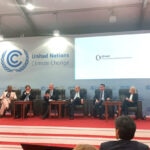Taking stock of COP27: the struggle to make the improbable possible
Taking stock of COP27: the struggle to make the improbable possible
After several intense days in Sharm El Sheikh, Egypt, it’s time to step back and take stock of the COP27, the UN-sponsored global climate summit. The first picture that comes to mind, which took shape as soon as I landed, has to do with the modern incongruence of today's world as applied to climate summits: 35,000 people, representing governments, institutions, businesses and civil society, gather in the desert, to address the toughest test that humankind will encounter in the next three decades.
As at most climate summits, there was some consensus and forward strides were achieved, but progress is clearly too slow in the face of the vast challenge before us. My takeaways from the event are six key points that illustrate the complexity of the issue from a financial perspective.
As at most climate summits, there was some consensus and forward strides were achieved, but progress is clearly too slow
First, I would underscore the geopolitical dimension. Although COP27 has been marked by the difficult global context, there was some good news. The United States and China will again work together on climate issues. Moreover, with Lula da Silva’s rock star-like comeback, Brazil has returned to the front line of climate action - this will give a strong voice to the world’s forests. African countries also played a leading role. A core theme of the summit was the growing tension between North and South.
And this, the focus of COP27, is precisely the second key point that I would like to bring to the fore: historical claims for support to developing countries.
Starting with the bad news, it was found that developed economies have continued to fall short of the target of $100 billion per year in financial contributions to emerging economies, reaching only $83 billion. However, it’s expected that this figure will be reached by 2023. It is left to the next summit, COP28, to agree on the new target from 2025 onward, which should be much higher.

Session in the Spanish pavilion. From left to right: Rafael Matos director of sustainability and social impact at Cofides; Helena Viñes, member of the United Nations group of experts on commitments to net zero emissions; Toni Ballabriga, global business director responsible for BBVA and José Luís Blasco, director of sustainability for Acciona.
But we also saw very encouraging bright spots: the creation of a reparations fund for harm sustained by emerging countries as a result of asymmetrical global development (although it remains to be determined at the next COP who will contribute, how much, and under what terms); a bid to reform multilateral financial institutions, starting with the World Bank; and initiatives to mobilize funding for specific countries. The latter point involves innovative mechanisms, such as the Just Energy Transition Partnerships in Indonesia and South Africa, with some $29 million committed, or the Climate Finance Leadership Initiative promoted by Bloomberg, which BBVA co-chairs in Colombia.
Thirdly, we saw proposals related to mitigation. While the 1.5ºC target agreed at Glasgow has been kept alive, it’s a pity that we haven’t been able to go a step further in cutting back on our use of fossil fuels. We are still at the same point we were a year ago, with a focus only on coal-fired energy. Neither did we hear good news on the updating of Nationally Determined Contributions (NDCs): only about thirty countries have updated their commitments, and some of them with very limited ambition. The main forward step in mitigation is the global commitment to a 30% reduction in methane emissions by 2030, already subscribed to by 150 countries--but not by China, India or Russia.
It’s a pity that we haven’t been able to go a step further in cutting back on our use of fossil fuels.
A fourth key takeaway from this summit is the progress on initiatives to encourage investment in decarbonization. For example, forward movement was achieved on the International Sustainability Reporting Standards (ISSB) and the Net-zero Data Public Utility, which will gradually bring together information for climate management at a global level. This is a key development for the financial sector.

GFANZ session about driving accountability on the net-zero commitments in the financial sector.
Another core topic is the growing pressure for integrity and credibility in voluntary pledges made by companies, cities and regions. I would like to put the spotlight on the joint report published by the United Nations Net-Zero Banking Alliance : more than 60 banks have already published interim decarbonization targets, as they promised to do when they joined the alliance. The report displays a critical reporting step that entities will have to implement systematically every year. Moreover, the Climate Change Expert Group appointed by the UN Secretary General himself, Antonio Guterres, issued a report setting out 10 recommendations to lend the utmost credibility to these private sector initiatives, which are so crucial to achieve the systemic change we need.
It is not enough to finance sustainable enterprise. We also need to finance the transition.
Finally, it has become clear that we need to transform the economy as a whole. It is not enough to finance sustainable enterprise. We also need to finance the transition of activities that are more difficult to decarbonize, and even to finance an orderly exit from assets that have no place in a net-zero economy. Only in this way can we achieve a just transition that leaves no one behind and provides opportunities for everyone.
These are my six takeaways from COP27. There are no doubt many more, but I think this is a reasonable summary of the event. As our Global Head of Sustainability, Javier Rodríguez Soler, stated a few days ago in this same forum, it is "an opportunity for global cooperation in a new world order." We have fallen far short of our ambitions, but I am among those who think we have made some progress and must continue in our struggle to make the improbable possible.